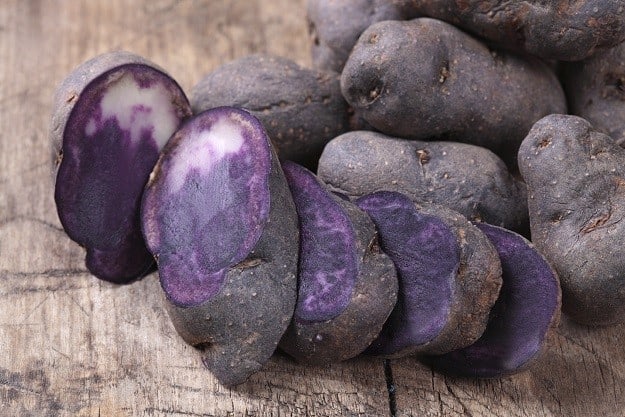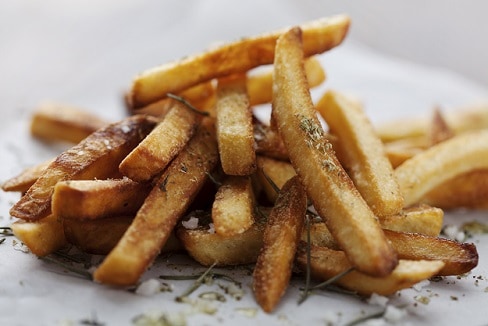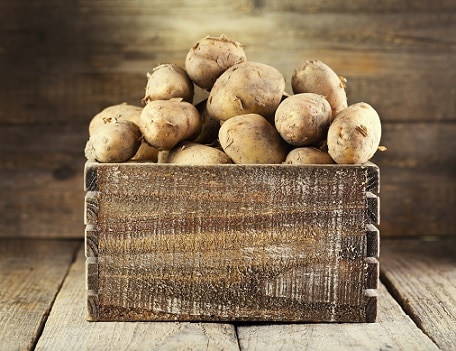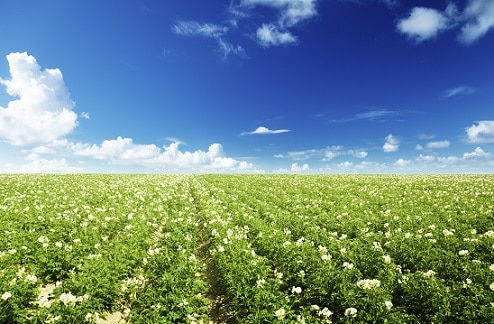 Potatoes are under attack from all sides these days. The new craze in the health world is the low carbohydrate diet, and potatoes do not conform to this.
Potatoes are under attack from all sides these days. The new craze in the health world is the low carbohydrate diet, and potatoes do not conform to this.
Paleo, primal, and Atkins followers frequently bash the potato for being too high in starchy carbohydrates, too good at raising blood sugar, too likely to cause diabetes etc.
Your standard roast potato is actually becoming a forbidden food in the eyes of many. With such negative publicity you might wonder whether potatoes can derail your acne clearing efforts too.
Well good news; potatoes are completely healthy for acne after all. In fact they’re among the most nutritious sources of carbohydrates in the world, especially compared to acne-causing villains like bread, pasta, and cereal.
How potatoes spike your insulin…
 When you consider their history it’s pretty obvious that they’re healthy. Potatoes have been keeping whole nations of people alive for generations. The Irish died in their millions because they couldn’t get enough of them.
When you consider their history it’s pretty obvious that they’re healthy. Potatoes have been keeping whole nations of people alive for generations. The Irish died in their millions because they couldn’t get enough of them.
People also forget that potatoes are actually a highly nutritious food. The main “problem” they have doesn’t actually damage your acne.
People don’t like the potato because it is very high in carbohydrates, which happen to digest very quickly. The potato is notorious for causing a big increase in blood sugar; one baked potato has a GI rating of 85. GI (glycaemic index) is a measure of how fast carbohydrates digest and it ranges from 0-100.
Read Annihilate Your Acne – learn how to clear your skin permanently
85 means that the carbs in potatoes digest very quickly and thus give you a big spike in blood sugar. Because of this, potatoes also cause a big rise in insulin, to convert the blood sugar to energy.
This particularly large GI is why everyone fears potatoes, because insulin is one of the worst hormones for your acne. High amounts of insulin bind to your sebaceous gland receptors, and cause them to produce more sebum and block your pores. This encourages p.acnes bacteria overgrowth and subsequently acne itself.
…and why it doesn’t matter for acne
The potato haters miss a key point; it is when insulin levels are constantly elevated that the hormone becomes bad for your skin.
Eating one potato will only spike your insulin for two hours after the meal; before long the insulin will have cleared the excess glucose from your bloodstream and levels will fall back to normal. You might have slightly oilier skin for an hour or two, but that’s not enough time to block your pores and cause acne.
Also, just about every carbohydrate will spike your insulin. Carrots, a sweet potato, beans, bananas – all are digested and converted to energy in the same way as potatoes. They cause a blood sugar spike and trigger an insulin spike to deal with it.
Recommended – 6 vitamins and minerals which could finally clear your acne
If you’re going to condemn potatoes then you have to condemn all other carbohydrates, and if you did that you’d be missing out on a lot of acne friendly foods and a lot of energy.
The real killer when it comes to acne is not an insulin spike, but insulin resistance. Insulin resistance is when your glucose stores no longer respond to insulin, due to being too full of stored energy. To compensate for this lack of responsivity, your pancreas pumps out even greater amounts of insulin on a constant basis.
Your insulin levels become constantly elevated – they have all day to block your pores and give p.acnes a new home. An insulin spike does not lead to permanently elevated insulin.
It’s highly unlikely that potatoes will make you insulin resistant. It could only happen if…
ONE – you eat a high carbohydrate diet already. If you already eat tons of bread, pasta, rice, and other carbohydrate rich foods then your energy stores will be very full and you’ll be heading for insulin resistance already. Eating potatoes will add to that problem.
TWO – you barely get any exercise. The simple rule with carbs is to consume as many as you can expend through exercise. If your exercise only includes walking around the house and getting into the car, then even potatoes contain too many carbohydrates.
THREE – you eat tons of them. If you ate two pounds of potatoes every day then you would probably become insulin resistant, if your level of activity was normal.
As an acne patient you shouldn’t be eating too many carbohydrates anyway, and you should be getting plenty of exercise. The amount of potatoes needed to get insulin resistant from them alone is far too high, so we can conclude that for a sensible person there is no acne risk at all.
Any other problems for acne?
Potatoes also contain glycoalkaloids, a form of plant toxin that is supposedly another reason to avoid potatoes. Glycoalkaloids have been linked to acne-relevant conditions like inflammation and generally impaired immune system functioning…
7 natural topical treatments which can massively reduce acne
…but the studies which showed glycoalkaloids to have unhealthy effects generally used very high doses, and there’s only moderate amounts in a potato. The glycoalkaloids are also found almost entirely in the skin, which can be peeled off anyway.
Why potatoes are very healthy
First of all, you do need some carbohydrates in your diet. Potatoes are a very rich source of them and they are also free from some of the problems of other carb sources. They’re a lot easier to digest than beans, healthier than grains and they are a richer source than carrots and bananas.
They’re also very low in acne-causing sugar; one large potato only contains around 3 grams. In fact, there’s really no problem with potatoes at all, as long as you don’t overdose. Along with sweet potatoes, they’re probably the healthiest carbohydrate source for an acne patient.
Firstly, most people view potatoes as a source of energy but they are actually far more nutritious than you would expect.
A large potato provides 50% of the daily allowance for vitamin C, 21% of the allowance for magnesium, 33% for manganese, and also good amounts of b-vitamins like vitamin B6 and B2. The potato is also one of the world’s best sources of potassium, which is important for controlling inflammation.
A potato is so nutritious that many poor communities have lived off them alone for a long period of time. It speaks for itself that so many Irish people died when they were deprived of them.
Why aloe vera is the nemesis of red and inflamed acne
Many tribes around the world eat a diet packed with root tubers similar to potatoes; one example is the Kitavans who are extremely healthy and most importantly, have no acne at all. Even better, the acne nutrients in potatoes are very well absorbed; they don’t contain any nutrient blocking compounds like phyctic acid, which wheat is very heavy in. Therefore, the nutrient bioavailability is excellent.
Secondly, potatoes don’t exactly have a reputation for being antioxidant rich either. That honour is usually reserved for the likes of berries, and green vegetables, but while potatoes certainly aren’t an antioxidant powerhouse, they do have more than you would expect. The ORAC score is a measure of a food’s antioxidant content and the potato scores 1332.
That is hardly staggering compared to blackberries, which score 5905, but it’s still enough to provide a good boost to your daily intake. You can find out how antioxidants prevent acne here.
Also remember that the method in which you cook a potato can greatly impact its antioxidant content:
- In this study, scientists took a potato and either baked it, microwaved it, or boiled it. They found that each method reduced the antioxidants but boiling only reduced them by a small amount. Microwaving reduced them significantly and the decline when baked was “severe”.
So remember that boiling is always your best bet for acne with potatoes, and luckily that’s the easiest way to cook them anyway.
PS: boiling may be OK for potatoes but it isn’t for other vegetables. Green vegetables like broccoli are notorious for losing their acne clearing nutrients when boiled.
The acne patient’s potato solution
The ideal acne lifestyle includes a good amount of exercise; therefore it is important to get at least 100 grams of carbohydrates per day. Eating potatoes is among the most nutritious ways to achieve that.
Why bread and pasta are a massive cause of acne
Potatoes are probably the most acne friendly carbohydrate source, but there are plenty of others that are nearly as healthy; these include sweet potatoes, pumpkins, butternut squash, and bananas. A good solution is to mainly get your carbs from potatoes and also eat other sources to add variety to your acne nutrient intake. Sweet potatoes are full of vitamin A, for example, whereas white potatoes have almost none.
It is still not entirely necessary to eat potatoes as you can get plenty of acne clearing nutrients from other sources, but they are great nevertheless. Just remember not to eat more carbohydrates than you need for energy; that’s when insulin resistance kicks in.
When to eat potatoes
 An acne patient’s ultimate insulin strategy is to keep your levels as low as you can for as long as you can. Insulin spikes are perfectly OK; they only last for a couple of hours, your energy gets processed, and you spend most of the day with low levels.
An acne patient’s ultimate insulin strategy is to keep your levels as low as you can for as long as you can. Insulin spikes are perfectly OK; they only last for a couple of hours, your energy gets processed, and you spend most of the day with low levels.
To achieve this, simply eat all your carbohydrate rich foods in one meal, including your potatoes. This has one simple benefit: all the insulin spikes that naturally occur when eating any carb source occur all at once, instead of throughout the day. You spend as much of the day as possible with low levels.
For example, if you eat a banana for breakfast, three carrots for lunch, and then a plateful of potatoes for dinner, then you have three separate insulin spikes which mean that your levels are high for about six hours in total.
The truth about dairy and acne
If however, you eat all of those foods at dinner, then your insulin spikes only once and thus remains elevated for only two hours. You get the exact same amount of energy, because you ate the same total of carbohydrates, but you minimise the potential for your skin to get oily and full of acne.
Another good idea is to eat your carb-rich meal in the evening. When carbohydrates digest they increase your blood sugar, and when this inevitably falls back down again it gives you an energy crash. Almost every office worker is familiar with the afternoon energy slump after eating sandwiches for lunch, and eating too many carbohydrates is the cause of it.
Eating all your carbs in the evening will still make you tired, but it’s the evening; you’re supposed to be tired anyway. This strategy will also help you sleep better, which is great because sleep deprivation is a big cause of acne.
Recap – eat your potatoes in a meal that contains all your other carbohydrates, and preferably eat this meal in the evening.
Organic vs non-organic
The only real downside of potatoes is that you have to buy them organically. Whereas sweet potatoes feature on the clean fifteen of agricultural produce nearly every year, white potatoes appear every year on the dirty dozen list.
Before seeds are even planted, insecticides designed to kill wireworms are sprayed into the soil. The potato seeds are drenched in fungicides to prevent the spread of blight. When potato plants are young and covered with dirt, they are blasted with systematic insecticides that penetrate the entire plant. Unlike sweet potatoes, you can’t just remove the pesticides with peeling because they’re absorbed into the entire tuber from day one.
According to whatsonmyfood.com, 80.2% of conventional potatoes are contaminated with chlorpropham, 25.5% are contaminated with imidacloprid, and 11.1% with flutolanil. In total, 35 different pesticides, herbicides, and fungicides have been detected by the USDA Pesticide Data Program. They include…
– 6 known or probable carcinogens.
– 12 suspected hormone disruptors.
– 7 neurotoxins.
– 6 developmental or reproductive toxins.
Now, those chemicals are all officially safe, or found in quantities below the toxicity levels in humans. But that story has been heard with acne causing chemicals like BPA and glyphosate, chemicals which are now revealed to be deadly…
Chlorpropham is used on potatoes to inhibit the growth of glycoalkaloids and prevent the potato from sprouting. The chemical is claimed by the agricultural industry to have no carcinogenic effects in humans. However, an assessment by the United States Environmental Protection Agency contradicts this:
- “Although chlorpropham is classified as a group E chemical (evidence of non-carcinogenicity for humans) according to the Agency’s cancer classification guidelines, one of its metabolites, 3-chloroaniline, is structurally similar to a known carcinogen, 4-chloroaniline… Based on the structure of the compounds, the Agency believes that 3-chloroaniline is probably, at most, equally as potent… [as] 4-chloroaniline.”
Then there’s the many studies on animals; one dermal study conducted on rabbits found that chlorpropham “produced skin irritation and blood cell changes.” Could it produce acne too? Chlorpropham even tested positive in two out of four mutagenicity studies. Other autopsies on animals have detected substantial inflammation of the stomach lining and intestines.
It’s clear that the apparent safety of chlorpropham, which is also known as Bud Nip, is all smoke and mirrors. Commercial potato farmers are clearly aware of its dangers, because many actually grow a separate chemical-free patch for themselves to eat.
What we have here is a chemical that causes DNA mutation, clear skin inflammation, and is nearly identical to a cancer-causing chemical, but is still being used by nearly every commercial potato farmer around.
Therefore, I’m nearly always eating organic potatoes for my daily carbohydrate source. I’d strongly recommend you to do the same, to keep your inflammation burden down as much as you can.
If you simply don’t have the money, then sweet potatoes are a better carbohydrate option for your acne. Roughly 45% of samples do contain dicloran contamination, but this is very easily removed with thorough peeling.
Read this article and learn why vitamin A is great for oily skin
The good news is that if you do opt for organic potatoes then you’ll also enjoy some extra acne nutrition. While not all fruits and vegetables contain more acne vitamins and acne minerals when grown organically, potatoes are ones that often do:
- This study found that organic potatoes did not contain significantly more useful acne minerals like zinc, magnesium, and iron. However, they did contain substantially more vitamin C and chlorogenic acid, a compound responsible for the health benefits of coffee. According to the full article, many older experiments had found that organic potatoes contain more vitamin C too. There was also substantially less artificial nitrate contamination.
- This study found that for key minerals such as potassium, calcium, and especially magnesium, organic potatoes were 15.8% to 34.5% more nutritious. An earlier 1998 study by the same authors found that organic potatoes were 14.8% higher in vitamin C.
The increase in acne nutrients is not substantial, but it’s a welcome bonus on top of the main goal of avoiding inflammatory agrochemical contamination.
Purple potatoes – the ultimate acne carbohydrate
 White potatoes are great for acne but purple potatoes are even better. If you’ve seen a purple potato at your grocery store then you’ve probably thought that it is some obscure and weird tasting vegetable that there’s no need to eat…
White potatoes are great for acne but purple potatoes are even better. If you’ve seen a purple potato at your grocery store then you’ve probably thought that it is some obscure and weird tasting vegetable that there’s no need to eat…
However, purple potatoes are just like regular potatoes – with one key difference. They are far higher in acne clearing antioxidants; their purple colour is due to high concentrations of anthocyanins, a class of potent antioxidants that is also found in berries, pomegranates, and all sorts of foods that are great for clearing acne.
One study found that purple potatoes contained five times as many antioxidants as white potatoes. That would make them nearly as powerful for acne as strawberries or raspberries.
Therefore if you can find them, then eating purple potatoes is a very good acne strategy. They taste very similar to white potatoes and they’re even better for clearing acne. In fact their extra antioxidants make them probably the best carbohydrate for acne in existence.
How to find them – purple potatoes originated in Bolivia and Peru and as a result are easy to find in South America. The good news is that they are now invading grocery stores around the rest of the world. They are still not common to find, but if you are motivated and search hard enough you will eventually find them.
Some supermarkets are being crafty and taking advantage of their benefits; the UK supermarket Sainsbury’s introduced them in 2010 and advertised them as being very healthy (which they are).
Other potato foods
Potatoes are great for clearing acne but they have to be real potatoes. This means a potato bought from your grocery store, then placed in a boiling pot, a microwave, or an oven. French fries, potato chips or any similar foods are not acceptable alternatives and are actually very unhealthy.
Firstly, many of the original potato’s acne nutrients get destroyed in the processing, particularly the delicate vitamin C. Secondly, they contain all sorts of additives, fillers, stabilisers, and preservatives. Many of these foods and in particular French fries, are cooked using hydrogenated oils AKA trans-fats, which are an unspeakable nightmare for your acne.
There is the argument that these foods taste better, but they actually don’t; you can easily make a potato taste good by slathering it with butter. Covering potato wedges with olive oil and roasting them in the oven makes them taste fantastic and olive oil is great for acne too.
One weird trick for acne free skin…
It is best to peel a potato to remove its glycoalkaloids but another reason to do so is for a topical acne treatment. Potato peels contain very high amounts of vitamin C and if you hold them to your face, your skin will absorb some of it. Vitamin C is a powerful antioxidant, which prevents the oxidative damage to your skin behind acne.
Potatoes also contain numerous other antioxidants and your skin will absorb some of them as well. Remember to use the underside of the peel as that is where all the acne benefits are concentrated. You need to use the part that is wet immediately after peeling; this liquid provides a carrier for the acne nutrients to get onto your skin.
Conclusion
Potatoes are an excellent food for acne and there’s no justifying the hate for them. They are only unhealthy for acne if you make a lot bad decisions like eating tons of them, not getting exercise, or eating too many carbohydrates in the rest of your diet.
Potatoes are one of, if not the healthiest carbohydrate source on the market. Their only real equal is the sweet potato. They are very healthy for your skin due to their acne nutrients, acne antioxidants, and low sugar content.
If you need more carbohydrates in your diet, then potatoes are a much better choice for acne than bread (full of gluten), beans, pasta, or rice.
NEXT: forget creams and moisturisers – discover the ultimate acne-clearing diet
Thanks for reading!